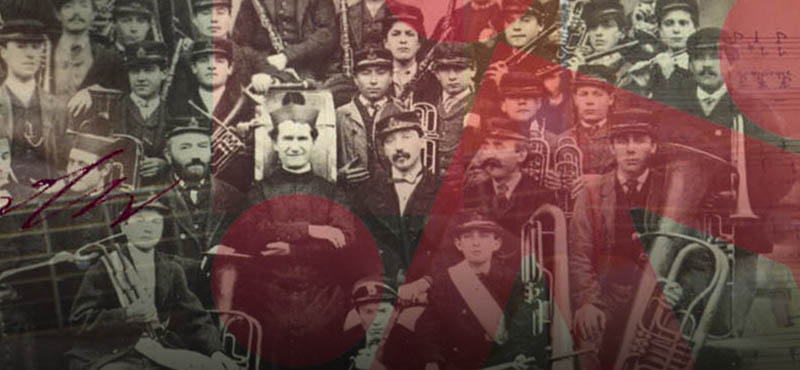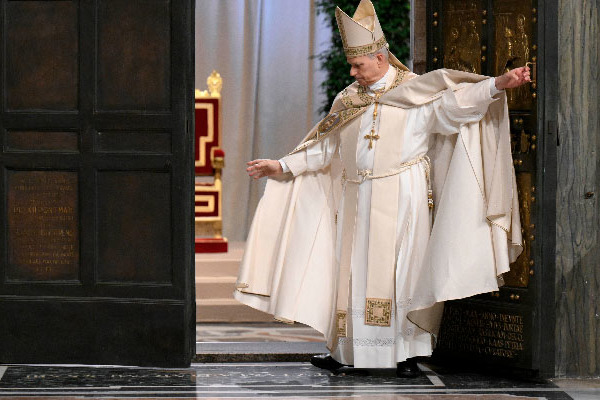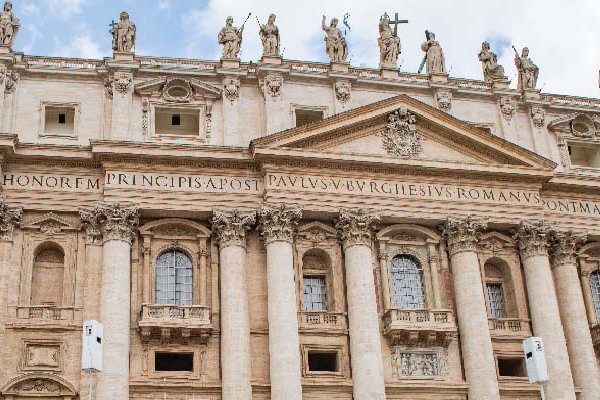
Térden állva kell evangelizálni
2013-07-07 Vasárnap | #Egyház | ARCHIVÁLT
Az evangelizációt térdepelve, imádkozva kell végezni, máskülönben mesterséggé válik. Papnak és apácának lenni nem mesterség. Nem olyan, mintha valaki szabó vagy szakács lenne. Másról van szó - hangoztatta az egyházfő a Hit Éve alkalmából a világ minden részéből Rómába érkezett, papnak és apácának készülő fiataloknak, akik között magyarok is voltak.
Ferenc pápa kijelentette: missziójuk az, hogy Isten vigaszának örömét, a kereszt tanúságát és az imát képviseljék. "Az embereknek ma szavakra is szükségük van, de főleg arra, hogy az Úr gyengédségét és vigaszának örömét elvigyük hozzájuk, ez melegíti a szíveket, feléleszti a reményt és a jó felé vonz" - mondta a pápa, hozzátéve, az egyház missziója az, hogy önmagából kilépve eljusson a világ és az egzisztencia perifériájára.
"Ne féljetek!" - idézte II. János Pál szavait Ferenc pápa hangsúlyozva, hogy az egyház nem egy felszentelt tagját látta már, aki félt vigasztalást nyújtani. Ferenc pápa hozzátette, hogy Krisztus is táska és szandál nélkül küldte az emberek közé tanítványait, "az Evangélium terjesztése nem az emberek számától, nem az intézmény tekintélyétől és ennek forrásaitól függ".
Az egyházfő megjegyezte, hogy papokat és apácákat nem reklámkampányokkal találják meg, hanem az Úr szólítja őket. "Az egyház nem a miénk, hanem Istené" - idézte az egyházfő XVI. Benedeket.
Ferenc pápa a szeminaristákkal, novíciusokkal és novíciákkal már szombaton is találkozott, amikor is az egyház megújításának szükségességéről beszélt, úgy fogalmazva, hogy a "régi, omló szerkezeteket meg kell újítani". Hozzátette, hogy az egyháznak nem a gazdagságot kell követnie, hanem tartania kell magát szegénységi fogadalmához. "Nekem fáj, amikor egy papot vagy apácát a legújabb típusú autóban látok" - mondta a pápa.
Az egyházfő hétfőn egy nyugat-európai perifériára, Lampedusa szigetére látogat el, ahol az Afrikából ide érkező bevándorlókért és a tengerbe veszett társaikért imádkozik.
MTI/CTV/Szaléziak.HU
Homily at Mass with Seminarians, Novices and those discerning their Vocations
Saint Peter's Basilica, 7 July 2013
Dear Brothers and Sisters, Yesterday I had the pleasure of meeting you, and today our joy is even greater, because we have gathered for the Eucharist on the Lord's Day. You are seminarians, novices, young people on a vocational journey, from every part of the world. You represent the Church's youth! If the Church is the Bride of Christ, you in a certain sense represent the moment of betrothal, the Spring of vocation, the season of discovery, assessment, formation. And it is a very beautiful season, in which foundations are laid for the future. Thank you for coming!
Today the word of God speaks to us of mission. Where does mission originate? The answer is simple: it originates from a call, the Lord's call, and when he calls people, he does so with a view to sending them out. But how is the one sent out meant to live? What are the reference points of Christian mission? The readings we have heard suggest three: the joy of consolation, the Cross and prayer.
The first element: the joy of consolation. The prophet Isaiah is addressing a people that has been through a dark period of exile, a very difficult trial. But now the time of consolation has come for Jerusalem; sadness and fear must give way to joy: "Rejoice .. be glad ... rejoice with her in joy," says the prophet (66:10). It is a great invitation to joy. Why? For what reason? Because the Lord is going to pour out over the Holy City and its inhabitants a "torrent" of consolation, of maternal tenderness: "You shall be carried upon her hip and dandled upon her knees. As one whom his mother comforts, so I will comfort you" (vv. 12-13). Every Christian, especially you and I, is called to be a bearer of this message of hope that gives serenity and joy: God's consolation, his tenderness towards all. But if we first experience the joy of being consoled by him, of being loved by him, then we can bring that joy to others. This is important if our mission is to be fruitful: to feel God's consolation and to pass it on to others! Isaiah's invitation must resound in our hearts: "Comfort, comfort my people" (40:1) and it must lead to mission. People today certainly need words, but most of all they need us to bear witness to the mercy and tenderness of the Lord, which warms the heart, rekindles hope, and attracts people towards the good. What a joy it is to bring God's consolation to others!
The second reference point of mission is the Cross of Christ. Saint Paul, writing to the Galatians, says: "Far be it from me to glory except in the Cross of our Lord Jesus Christ" (6:14). And he speaks of the "marks of Jesus", that is, the wounds of the crucified Lord, as a countersign, as the distinctive mark of his life as an Apostle of the Gospel. In his ministry Paul experienced suffering, weakness and defeat, but also joy and consolation. This is the Paschal mystery of Jesus: the mystery of death and resurrection. And it was precisely by letting himself be conformed to the death of Jesus that Saint Paul became a sharer in his resurrection, in his victory. In the hour of darkness and trial, the dawn of light and salvation is already present and operative. The Paschal mystery is the beating heart of the Church's mission! And if we remain within this mystery, we are sheltered both from a worldly and triumphalistic view of mission and from the discouragement that can result from trials and failures. The fruitfulness of the Gospel proclamation is measured neither by success nor by failure according to the criteria of human evaluation, but by becoming conformed to the logic of the Cross of Jesus, which is the logic of stepping outside oneself and spending oneself, the logic of love. It is the Cross – the Cross that is always present with Christ – which guarantees the fruitfulness of our mission. And it is from the Cross, the supreme act of mercy and love, that we are reborn as a "new creation" (Gal 6:15).
Finally the third element: prayer. In the Gospel we heard: "Pray therefore the Lord of the harvest, to send out labourers into his harvest" (Lk 10:2). The labourers for the harvest are not chosen through advertising campaigns or appeals for service and generosity, but they are "chosen" and "sent" by God. For this, prayer is important. The Church, as Benedict XVI has often reiterated, is not ours, but God's; the field to be cultivated is his. The mission, then, is primarily about grace. And if the Apostle is born of prayer, he finds in prayer the light and strength for his action. Our mission ceases to bear fruit, indeed, it is extinguished the moment the link with its source, with the Lord, is interrupted.
Dear seminarians, dear novices, dear young people discerning your vocations: "evangelization is done on one's knees", as one of you said to me the other day. Always be men and women of prayer! Without a constant relationship with God, the mission becomes a job. The risk of activism, of relying too much on structures, is an ever-present danger. If we look towards Jesus, we see that prior to any important decision or event he recollected himself in intense and prolonged prayer. Let us cultivate the contemplative dimension, even amid the whirlwind of more urgent and pressing duties. And the more the mission calls you to go out to the margins of existence, let your heart be the more closely united to Christ's heart, full of mercy and love. Herein lies the secret of the fruitfulness of a disciple of the Lord!
Jesus sends his followers out with no "purse, no bag, no sandals" (Lk 10:4). The spread of the Gospel is not guaranteed either by the number of persons, or by the prestige of the institution, or by the quantity of available resources. What counts is to be permeated by the love of Christ, to let oneself be led by the Holy Spirit and to graft one's own life onto the tree of life, which is the Lord's Cross.Dear friends, with great confidence I entrust you to the intercession of Mary Most Holy. She is the Mother who helps us to take life decisions freely and without fear. May she help you to bear witness to the joy of God's consolation, to conform yourselves to the logic of love of the Cross, to grow in ever deeper union with the Lord. Then your lives will be rich and fruitful! Amen.







